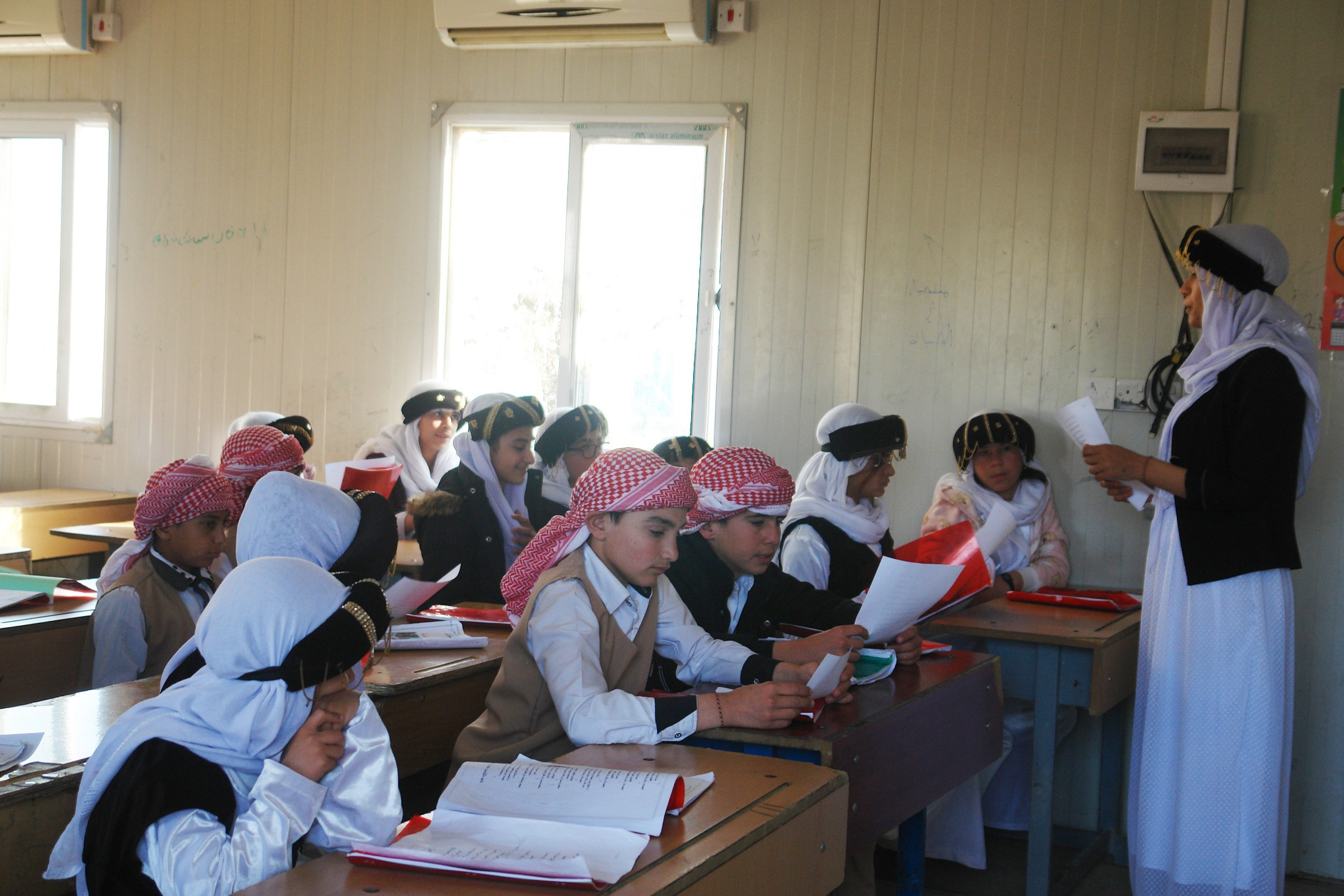Shirin Haider faced two unpleasant options in the Islamic State group (IS). She either had to escape the IS alone or staying under the rule of the group with her two children. She forcefully and unwillingly chose the first one.
The story of Shirin happened out of her will and preference, from being abducted and raped to give birth twice and leaving the children to an unknown fate. Yazidis women, who have not even left their children inside the IS, have experienced numerous problems because they are under the immense pressure of society, religion, and law.
“I always asked myself a question: would the Yazidis and my family accept if I keep the children of the IS members? Eventually, I reached a belief that one day will come when I will have to leave them,” Sheren said.
This Yazidi girl, along thousands of other Yazidi women, were enslaved in August 2014 in Sinjar. Only his brother rescued. Still, the fate of her father and her three sisters are unknown.
“I was under the rule of IS for more than four years. I experienced all types of diseases and torture. The worst experience was that when a Bahraini IS member, who had three wives, raped me and did not allow me to take contraceptive pills. He said, let the number of the fighters increase.”
Shirin became pregnant and gave birth twice under the rape and torture of that IS member. Her youngest child is now four years.
The IS took over the city of Mosul and later raided other regions of Nineveh province, such as Sinjar, where the group took more than six thousand Yazidis captive. Most of them were women and children who were enslaved.
Yazidi women faced violence, torture, and rape. Part of them escaped from the IS, and some were rescued or released in return for money. However, the fate of half of them remains unknown even though IS has been defeated.
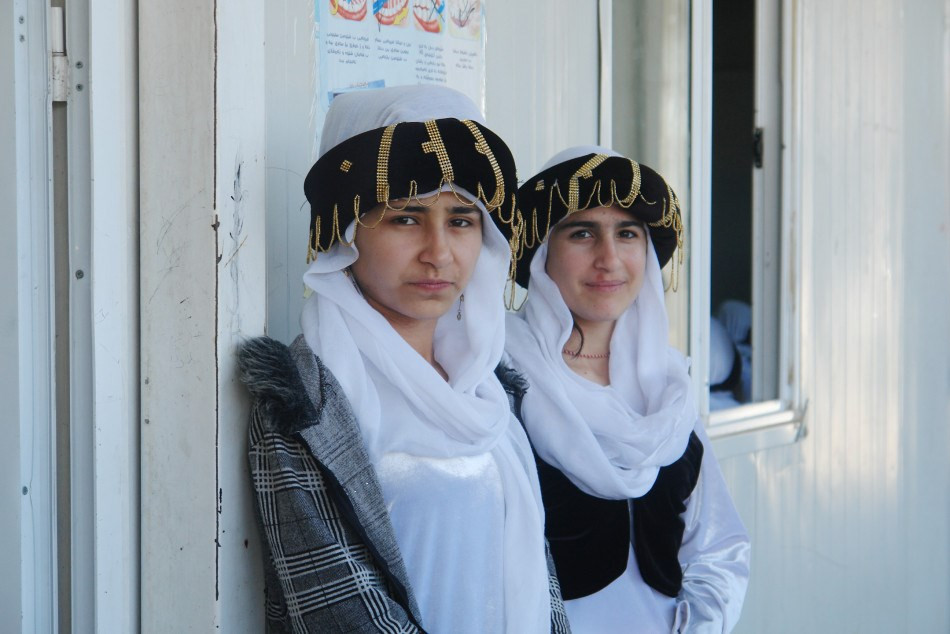
Duhok, Two Yazidi students at Kani Spee school, March 2019. Photo: Ammar Azizi
Shirin said she forecfully rose her children until the day that she was afraid of came when she had to make the decision to escape from the IS.
“A day before I was rescued, my brother and I had a phone call. I said I have two children and asked him if they agree to bring my children back with me. My brother said that they only want me and do not want me to bring back the children because they will not be accepted by society and the Yazidi religious leaders.”
Shirin followed what his brother said. On November 29, 2017, she said goodbye to her two children for the last time and came back. Ever since she lives in Duhok province with a new pain. She stated, “regardless of all the unpleasant experience, sometimes I miss the children, but I want Yazidi permissible children.”
Among the hundreds of Yazidi women who were rescued, in particular, those who were in Syria, IS members got them pregnant and they gave birth, but they keep the story secret due to the fear of social judgment.
A source, who is familiar with the cases of those Yazidi women, said, “some of those women have brought back their children and secretly raise them because they have not registered them and the others give their children to the security forces and do not want to take them to their families.”
Based on field trips and investigation of a KirkukNow reporter, some of those Yazidi women who gave birth inside IS are protected by the humanitarian organizations until their cases are decided upon.
Hanifa Abbas, a Yazidi activist, who had worked for an American NGO, claimed, “a while ago, numerous organizations monitored those women who were rescued with their children so that no one would say bad words to them.”
“I cannot reveal the number of the women, but most of them have either lost their family members or their family members have remained unknown. Now the center no longer exists, and all of them have been moved abroad.”
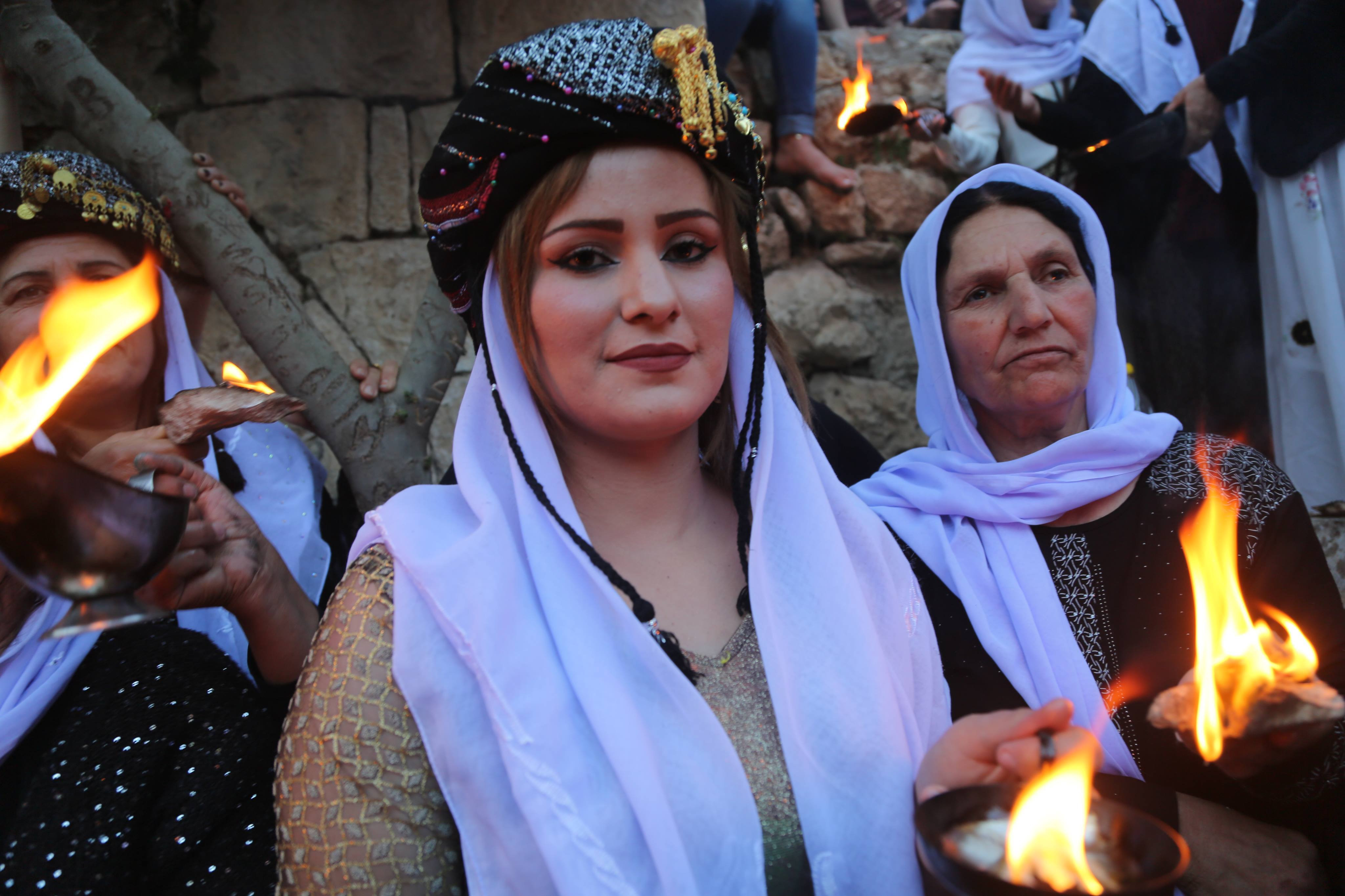
Lalish, Sinjar, a Yazidi girl is celebrating Yazidi New Year (Red Wednesday). Photo: KirkukNow
Family and Society; Real Barriers
The Yazidi women were given two options by their families and ethnic group: one was coming back alone and leaving the children inside the IS and the other was staying in exile with their children.
The most significant barrier to receive the Yazidi women were their families who are under the effects of society.
Sirwan Haider, Shirin’s brother, said, “until now, the fate of my three sisters remains unknown. How could I let my sister bring back her children whose father was an IS member?”
He asked, “ok, under what name, would you issue their national ID? ISIS members destroyed our houses, how come we raise their children? even God does not accept this.”
Only in 2018, more than 15 Yazidi women took their lives in the IDP camps. Some of them were those who were enslaved by IS members, and the others lost their families at the hand of the group.
Shirin’s brother insisted on his stance against the return of his sister’s children. “of course, I do not allow anyone to bring back children of IS.”
He thinks that receiving those children is “a huge embarrassment” for the Yazidis, and it is not less than what the Yazidis went through. “This problem belongs to the United Nations and the International Coalition. Let them solve the issue and raise the children of IS members.”
Religion; the Decision Maker
In the Yazidi community, religion has a vital role in the determination of the cases of the Yazidis abductees. The religious figures published a formal pronouncement to accept the Yazidis women who were rescued from IS.
The cases of Yazidi women who gave birth inside the IS group are complex, and there are disagreements over it. As a result, it has been suspended religiously, too.
Hadi Baba Sheikh, head of the office of the Yazidi’s most senior religious leader, Baba Sheikh, said, “it is a very difficult subject, so it cannot be looked at simply or without deep thinking.”
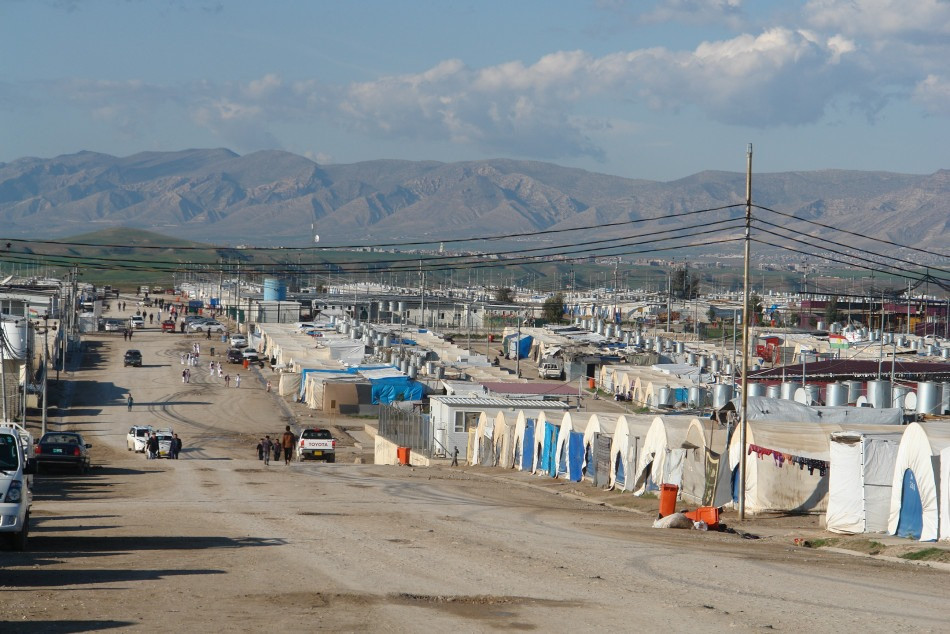
Duhok, Kabartu Camp that houses thousands of Yazidis, 2019. Photo: Ammar Azizi
Yazidi means “praying the god,” and Yazidi people explained themselves that way. Their religious texts are written in the Kurdish Kurmanji dialect. They invite no one for their religious ceremonies. They neither allow any Yazidi to convert to another belief, nor do they accept any one’s conversion to their religion.
“Receiving the IS group children is against the rules of the religion because we only accept those children whose fathers and mothers are Yazidis. So we will not receive those children whatsoever,” Baba Sheikh said.
He demonstrated the stance of the Yazidi spiritual leader and claimed, “all the crimes that have been committed against us were due to our religions, so we are not sacrificing our religion for the sake of some children.”
The children whose fathers and mothers are Yazidi and have been rescued from IS will go through religious education to remove the effects of the beliefs of IS and reintegrate them into the normal life of Yazidis.
Baba Sheikh spoke on the issue of the registration of the IS children if the children are received. He asked under whose names they will be registered? He answered, “they cannot be registered under the name of their mothers. They have to be registered under the name of their fathers, and “Muslim” should be written on their ID. And eventually, those Muslim children become the inheritance of the Yazidi family, which cannot be accepted.”
One of the solutions that have been proposed is opening an orphanage for the children. Another solution is that they should be moved abroad. Baba Sheikh stated that at the end, all the legal procedures and the determination of their cases are up to the Iraqi government.
On April 24, 2019, the Yazidi spiritual council decided to receive all Yazidi people, including the women, with their children who were rescued from IS. It was issued in a statement that had the signature of Mer Hazim Tahsin Beg on it.
The statement brought immense condemnation amongst the Yazidi community, especially among the Yazidi religious leaders.
The council, after three days on April 27, issued another statement in which they said that they did not mean accepting those children born of rape but rather those Yazidi women and children who were taken by IS at an early age.
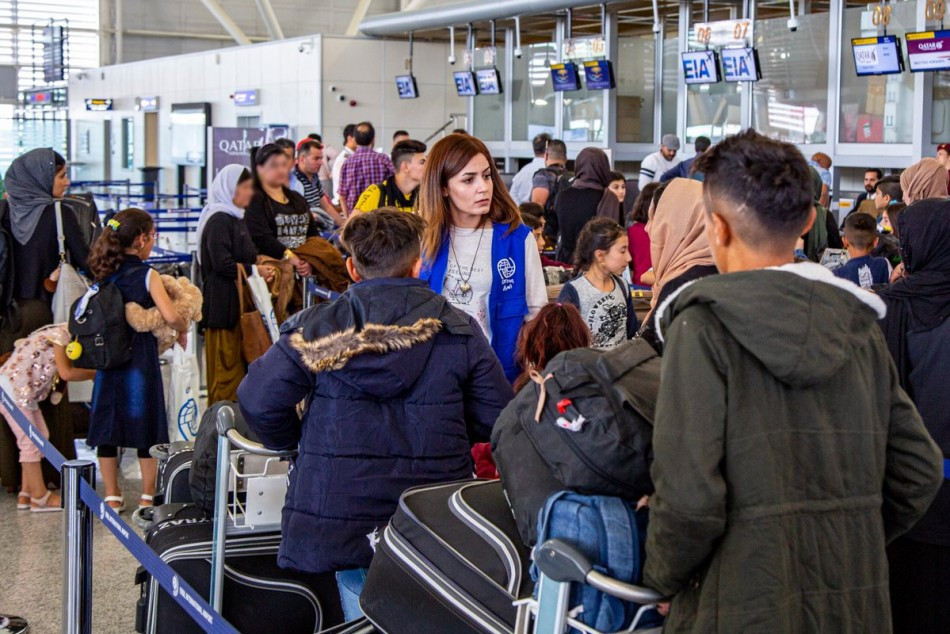
Erbil, more than a hundred Yazidis are departing to France, March 2019. Photo: International Organization for Migration
What Are the Legal Solutions?
For the determinization of the cases of Yazidi women who have children of rape, the religious figures wait to receive a legal guarantee that the cases would not negatively affect the role and the future of the religion.
The latest Yazidi project is proposed to the parliament by the Iraqi President Barham Salih. The articles of the proposal offer the legal solutions for the children born of rape without giving details about the procedure. Another section is about opening a court of cassation in Sinjar district to solve the legal status of those children.
The reason for the bill, which the Iraqi parliament is yet to approve, is to show the crimes committed against the Yazidis and to solve the legal status of the children born of rape.
Bahar Mahmood, a member of the Iraqi legal affairs committee in the Iraqi parliament, said, “the representative of the Yazidi in Parliament has brought a bill. After our discussion on it, It will put on our agenda. I do not want to talk about its details, but surely we will find proper solutions that are in line with the law and the Yazidi religion.”
What has caused the Yazidi to fear is the current law. They ask for a particular law so that the children will be considered as Yazidis, not Muslims.
According to the national ID law, which was published in Waqeey newspaper in 2016, minors will follow the religion of their mother and father, who are Muslim. Another article mentions that those children who are found or their identity of their parents are unknown will be considered Iraqi Muslims if the otherwise is not proven.
Bzhar Khalid, head of legal affairs committee in the Kurdistan Region’s parliament, said, “we have not done anything on this subject, but it is in our plan, and we will form numerous committees in cooperation with the speaker of parliament, the govermenrt, and the spiritual council of Yazidis to solve the problem.”
Besides the Iraqi government, the Yazidis wait for the Kurdistan Regional Government (KRG) to take serious steps to solve their problems as a significant number of the Yazid live in displacement in the region.
The Final hope
The fate of Shrini’s children might have already vanished. Still, other Yazidi women wait for solutions to themselves and their children so that they would continue living in their community.
As it appears, one side does not have the solution; the families and the society wait for the decisions of the religious leaders who demand a legal framework.
Faris Kti, an advisor to the Yazidi Spritiucal council, said, “we have many meetings on this subject, but we have not reached the final solution. We are part of the problem, and the other people and institutions, including the Iraqi government and the families of IS group, should have a role in solving the issue.
“We are ready for negotiations and solutions. Our door is open only if it is not at the expenses of the principles of the Yazidi religion because no one cannot change any principle of the religion. So we think of a solution that would not be a problem to our religion and society in the future,” Kti said.
The families of ISIS victims and rescued people formed a council in March 2019, aiming at protecting and achieving their rights and being consulted with any decision that is about them.
Nadia Murad, the Yazidi Noble Peace Prize winner, published a video in which she reaffirmed her support for those women who live misery life due to their children.
Murad in the video stated that the first and the final decision should be left to their families because on one can prevent them from taking those steps that are related to them, and if they decide to come back with their children, then the society should respect their decision, welcome and help them.
According to the Iraqi constitution, the state is responsible for protecting its citizens against any acts driven by beliefs, political opinions, and religion.
Universal Declaration of Human Rights also rejects intervention in individuals’ lives, every mother and child has the right of standard living, monitoring, helping and protection even if the child is born inside or outside marriage.
Shirin was deprived of the normal life the Iraqi constitution and the human rights offer. Would the other Yazidi women achieve it or not? The answer to this question is up to the Iraqi jurisdiction and the Yazidi society.

